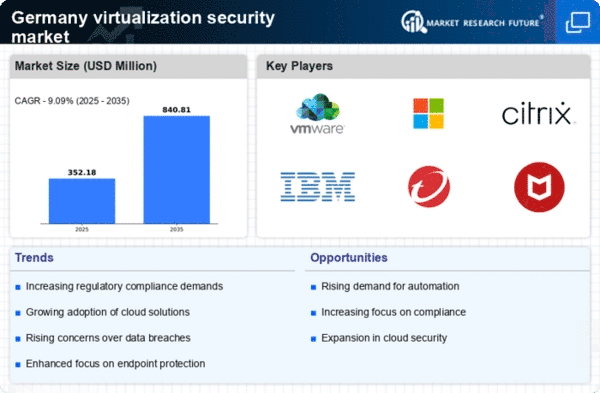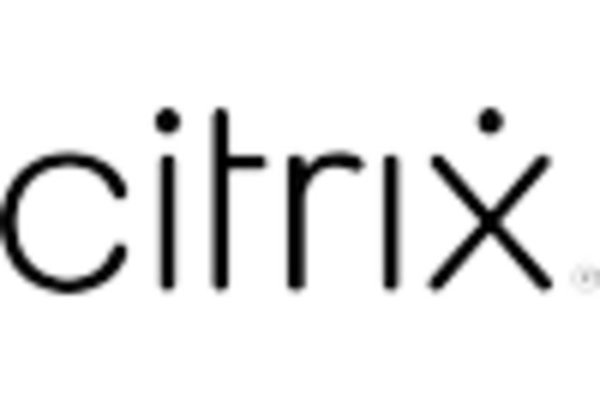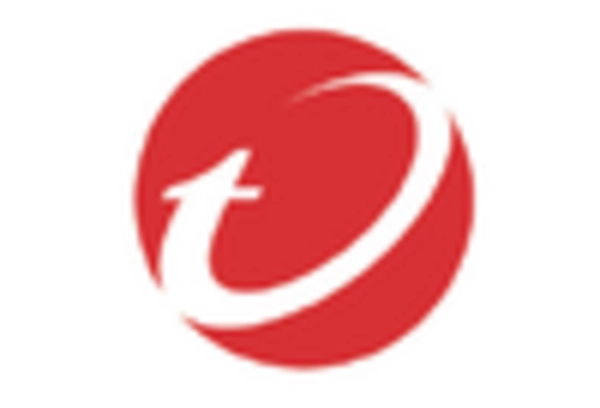Regulatory Compliance Pressures
In Germany, stringent data protection regulations, such as the General Data Protection Regulation (GDPR), impose significant compliance requirements on organizations. These regulations necessitate the implementation of comprehensive security measures to protect personal data, thereby driving demand within the virtualization security market. Companies face substantial fines for non-compliance, which can reach up to €20 million or 4% of annual global turnover, whichever is higher. As a result, organizations are increasingly adopting virtualization security solutions to ensure compliance and mitigate legal risks. This regulatory landscape not only influences security investments but also shapes the development of innovative solutions tailored to meet compliance standards.
Rising Awareness of Data Privacy
There is a growing awareness of data privacy issues among consumers and businesses in Germany, which is influencing the virtualization security market. As individuals become more conscious of how their data is handled, organizations are compelled to adopt stringent security measures to protect personal information. This heightened awareness is driving demand for virtualization security solutions that ensure data integrity and confidentiality. Companies are increasingly investing in technologies that provide visibility and control over their virtual environments, thereby enhancing their ability to safeguard sensitive data. This trend suggests a robust growth trajectory for the virtualization security market as organizations strive to meet consumer expectations and regulatory requirements.
Shift Towards Cloud-Based Solutions
The transition to cloud-based services in Germany is reshaping the virtualization security market. As businesses increasingly adopt cloud technologies, they require security solutions that can effectively protect virtualized environments. The cloud services market in Germany is projected to grow at a CAGR of 15% from 2025 to 2030, indicating a robust demand for virtualization security solutions that can secure these environments. Organizations are seeking to leverage the scalability and flexibility of cloud services while ensuring that their data remains secure. This shift is prompting security vendors to innovate and offer solutions that cater specifically to the unique challenges posed by cloud-based virtualization.
Growing Cybersecurity Threat Landscape
The increasing frequency and sophistication of cyber threats in Germany has propelled the demand for robust security solutions within the virtualization security market. As organizations migrate to virtual environments, they become more susceptible to attacks such as ransomware and data breaches. Reports indicate that cybercrime costs German businesses approximately €100 billion annually, highlighting the urgent need for enhanced security measures. This environment of heightened risk compels companies to invest in virtualization security solutions to safeguard sensitive data and maintain operational integrity. Consequently, the virtualization security market is growing as organizations prioritize protecting their virtual infrastructures from evolving threats..
Increased Investment in IT Infrastructure
German organizations are significantly investing in IT infrastructure to enhance operational efficiency and competitiveness. This trend is positively impacting the virtualization security market, as companies recognize the need for secure virtual environments to support their digital transformation initiatives. The IT spending in Germany is expected to reach €100 billion in 2025, with a substantial portion allocated to security solutions. As businesses modernize their IT frameworks, they are prioritizing virtualization security to protect their assets and ensure business continuity. This investment trend is likely to drive the growth of the virtualization security market as organizations seek to fortify their defenses against potential threats.
















